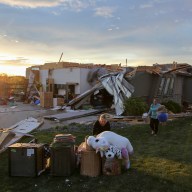KABUL – Authorities have hired some 10,000 Afghan tribesmen to protect this month’s presidential election, an Afghan official said Tuesday, raising the possibility that village militias could be enlisted to fight against the Taliban.
The hired guns highlight attempts by authorities to bolster security in Afghanistan’s insurgency-hit provinces but also underscore a renewed focus on raising tribal militias to deal with the growing Taliban threat just as Sunni Arab militias were engaged to help reduce violence in Iraq.
The new force will initially help secure polling centres in 21 of Afghanistan’s 34 provinces during the Aug. 20 election, said Arif Noorzai, the head of the Independent Directorate for the Protection of Public Properties and Highways by Tribal Support.
“We are trying to provide security for the polling centres and pave the way for the people to participate in the elections,” Noorzai said. “They are filling the places where there are no police or the government has a shortage of security forces.”
Zemeri Bashary, the Interior Ministry spokesman, said the new force will not be armed by authorities or given uniforms, but they will carry weapons. They will only assist the security forces in the areas where they live, Bashary said.
The community-based force has echoes in the American military’s efforts in Iraq to form alliances with Sunni Arab tribesmen. The Sunni militias helped turn the tide in Iraq, contributing to a dramatic reduction in violence, but friction has arisen between the militias and the Shiite-led Iraqi government.
The members of the new Afghan force have been hired from the communities where they will serve, and will be paid $160 monthly for their work, Noorzai said.
Afghan election officials have provided security forces with a list of some 7,000 polling centres where voting should take place. Security forces have not yet determined how many of those centres can be secured on polling day. Hundreds are likely to remain shut because of fears of violence.
Almost all problematic polling centres are in areas where the largest ethnic group, Pashtuns, live. Low turnout in such areas could harm President Hamid Karzai, himself a Pashtun. Karzai is the leading candidate in opinion polls, and most observers expect him to win a second five-year term.
There are over 100,000 U.S. and NATO troops in the country as well as 175,000 Afghan soldiers and police. But in a country of 33 million people with rugged terrain, few roads and scattered population, providing security during an active insurgency is difficult.
It was not immediately clear whether authorities plan to institutionalize the new force and eventually fold it into the country’s security architecture after the elections. Militias in Afghanistan have a bad reputation for their role during the civil war that engulfed the country after Soviet troops left in late 1989.
The Taliban came to power in the mid-1990s partly by offering to get rid off such militias.
Noorzai said it was unlikely that the militias would attempt to coerce voters at the polling centres because they would be protecting their own districts, which means the voters will be from their own tribes.
Maqbool Ahmad, an aide to Noorzai, said that authorities will decide about the future of this project after a month.
















